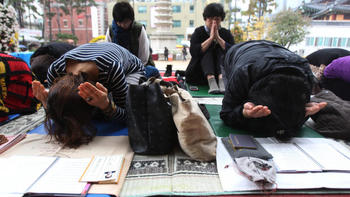韓国教育事情ー過熱気味の大学受験ー① [教育]
South Korea's dreaded college entrance exam is the stuff of high school nightmares, but is it producing "robots"?
(CBS 2013/11/7)

★韓国のある寺院で行われた特別儀式でわが子の大学入学合格祈願をしている両親たちー2013年10月6日 /AP
韓国の過激な受験競争
★韓国の大学受験戦争は日本の受験地獄のお株を奪うような激しさを見せています。
韓国の高校生にとっては恐怖となっている韓国の大学入試受験事情をレポートします。
★11月7日、韓国内の高校生65万人以上があの大学入学試験「大学修学能力試験(
日本のセンター試験に相当)」を受験した。
この試験は韓国では「修能(スヌン)」と言う名でよく知られているが、受験時間は8時間にも及び、受験科目は大学レベルの数学、歴史、科学、国語、英語となっている。
過酷な大学入学試験問題作成委員の実態
大学入学試験問題作成委員会のメンバーは国内から集められた大学教授や高校教師など490人から構成されている。
メンバーは人里離れた山岳地方にある秘密の場所に3か月間も隔離された状態に置かれる。
そして携帯電話やe-mailの使用は禁じられていて、実質的には外界からシャットアウトされた状態で、外出や家族との連絡も出来ない。
他人にはもちろん、妻や夫にも自分が世界で最も難しいと言われている韓国の大学入学試験問題を作成する委員に選ばれたことを話すことも禁止されている。
選ばれた委員たちは家族には1か月にも及ぶ不思議な不在の言い訳に出張や学術会議の出席などとしている。
委員たちは試験作成場所には一般の書店で誰でも簡単に手に入るような参考書を何千冊も持ち込むが、これは入試問題を作成するのに参考にするというのではない。
実は委員たちが作成した問題と同じ内容の問題が大学受験専門店から出版されている参考書に書かれている何千という予想問題の中に含まれていないかどうかをチェックするためなのである。
毎年1回実施されるこの「大学修学能力試験」は、受験生が翌年の春から通うことになる大学を決定する非常に重要な試験となっている。
韓国の過激な受験戦争ー②に続く
★参考記事(JBPress)
韓国の教育制度:大いなる減圧"I spent 19 years preparing for this exam," a high school senior said as he walked past a crowd of cheering onlookers. "I feel very nervous."
More than 650,000 South Korean high school seniors took the nation's notorious college entrance exam Thursday; the Scholastic Aptitude Test, popularly known to South Koreans as the "suneung." The eight-hour exam tests pupils on subjects including college-level math, history, science, Korean language, and English.
This year's exam was created by a 490-member panel of professors and high school teachers from across the nation. The panel sequestered itself in a secret location in the sparsely populated, mountainous region of Gangwon Province for 34 days, starting on Oct. 5.
Panel members must surrender cell phones and are effectively cut-off from the outside world -- they cannot go out, send emails, make phone calls, or contact their families.
They are forbidden from telling anyone, including their spouses, that they have even been selected to help author one of the world's most difficult college entrance exams. Instead they come up with excuses -- a business trip or an academic conference -- to explain their mysterious absence.
Panel members reportedly bring with them thousands of test-prep books, which are readily available in bookstores. They don't bring them for ideas, but to make sure the test questions they come up with don't match any of the thousands of mock questions produced by an army of suneung-specific publishing houses.
Administered just once every year, the exam is the primary factor to determine which college young South Koreans are able to start studying at in the spring. In the run-up to the exam, seniors typically spend more than 10 hours each day studying. When school ends in the afternoon, students stay holed up in after-school private cram sessions known as "hagwon" well into the evening, sometimes until midnight.
A 2011 survey by the Korea Centers for Disease Control and Prevention found that an average South Korean high school senior slept just 5.5 hours a night.
The excessive studying prompted South Korea's Ministry of Education to push for legislation prohibiting hagwons from operating past 10 p.m., which provoked a fierce backlash from the multi-million dollar private education industry -- and from worried parents.
Although South Korea's education system has earned recognition abroad -- in the 2009 PISA assessments, a triennial survey that evaluates the educational achievements of 15-year-olds in OECD member countries, South Korea ranked second in reading, fourth in mathematics, and sixth in science -- its heavy emphasis on memorization and learning by rote has led to a growing disillusionment.
"No discussion or debate takes place in a South Korean high school classroom," said Lee Yun-ho, a professor in social studies at Sunchon National University. "It's all about memorization. Students mostly spend their time memorizing an exorbitant amount of material in order to do well on suneung, which will mainly decide how high-ranking a college they can get into."
Once students get through the entrance exam and make it into college, Lee said, they are ill-equipped for the kind of original research and genuine intellectual curiosity that university-level education requires.
"In South Korea, the teacher speaks and the students just sit still, listen, and memorize. So when they come to college, they are unable to take on independent research projects or engage in creative thinking," he argued.
South Korea's education system, he said, "produces robots."
Filed by CBS News' Samuel Songhoon Lee




コメント 0